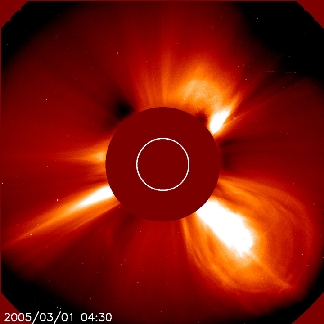Three Different CMEs (March 3, 2005)

Hi-res TIF (2.6M)
MPEG large (2.1M), small (568K)
QT large (1.2M), small (348K)
|
The LASCO coronagraphs, which create artificial solar eclipses by blocking the
light of the solar disk
so we can see the much fainter glow of the Sun's hot corona, observed a series of
three coronal mass
ejections (CMEs) over about 12 hours beginning late February 28, 2005. Each one
appeared quite
differently from the others. All of these were determined to have originated from
the far-side of the
Sun. The first event presented an uneven ragged front that spread across much of
the lower half of the
Sun. The second CME seemed to blossom out from a narrower area into a big
lightbulb-shape with a bright
center. The third CME, which followed immediately on the heels of the second CME,
blasted out above the
Sun in a fainter, more diffuse push with a narrow and darker center. It should be
noted that the
second, bulbous CME corresponds best to the most traditional shape of a CME. CMEs still occur, though less frequently because the Sun is definitely in a less active period of its 11-year solar cycle.Clearly though, some activity continues. SOHO began its Weekly Pick some time after sending a weekly image or video clip to the American Museum of Natural History (Rose Center) in New York City. There, the SOHO Weekly Pick is displayed with some annotations on a large plasma display. If your institution would also like to receive the same Weekly Pick from us for display (usually in Photoshop or QuickTime format), please send your inquiry to steele.hill@gsfc.nasa.gov. |


